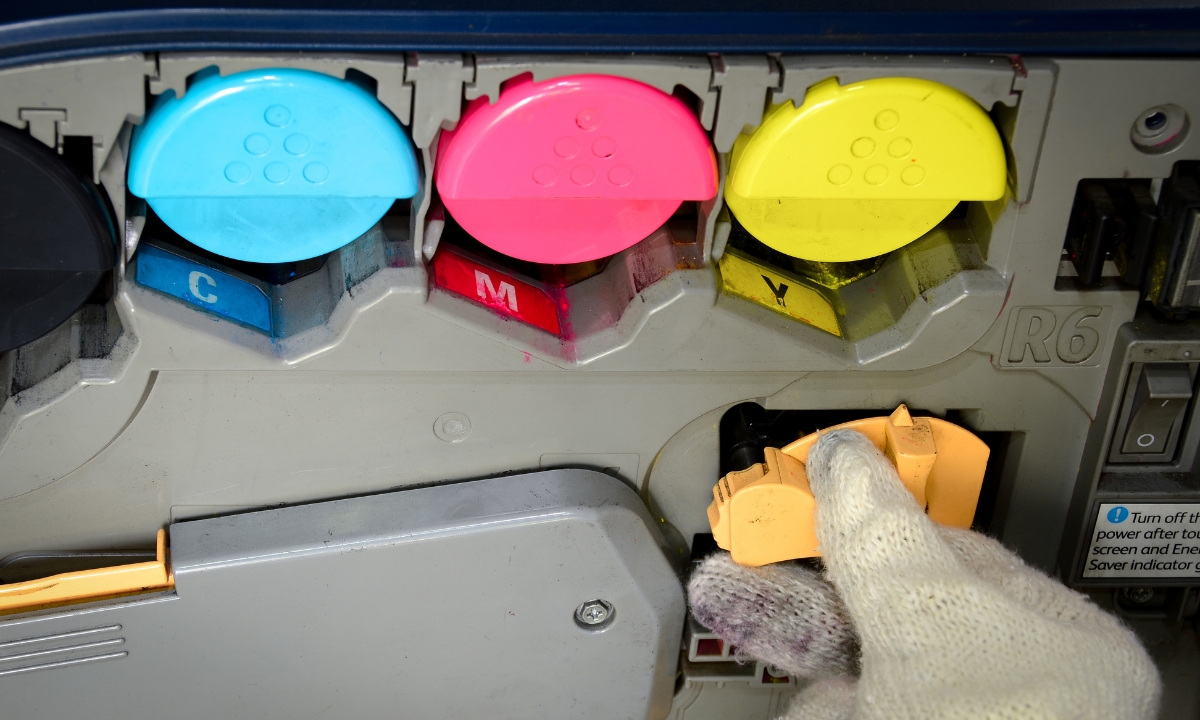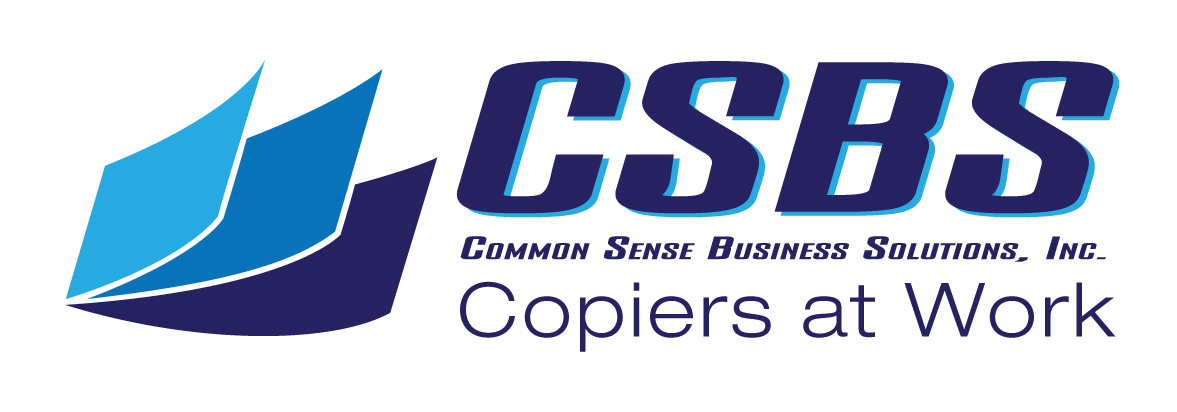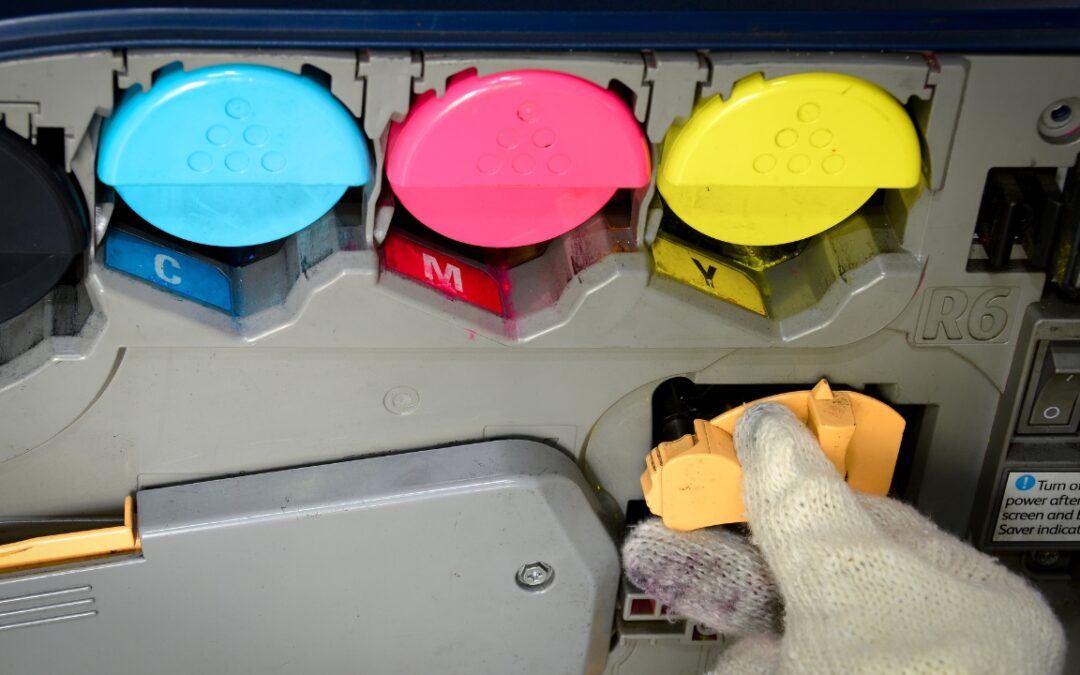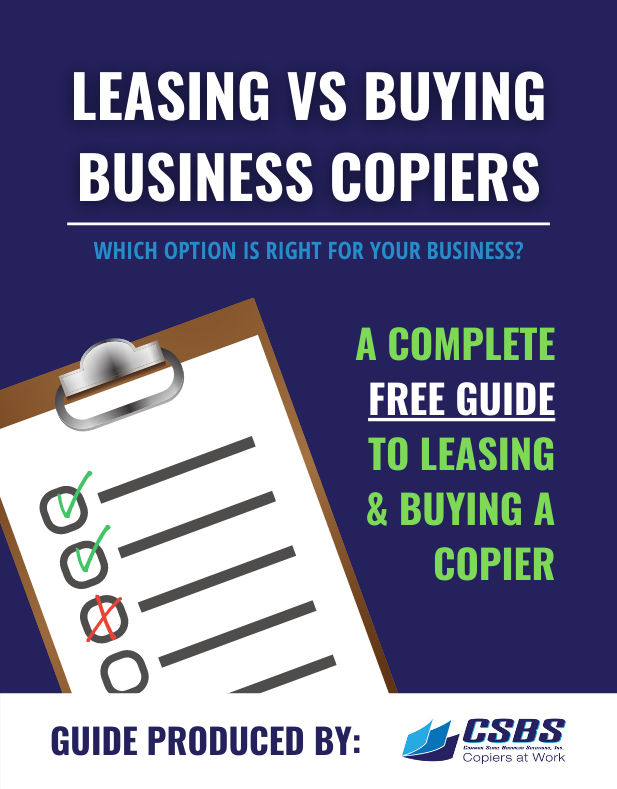We Updated This Blog In December of 2023 to Focus On The 10 Things To Look For In A Copier Lease
In every small business office, printers and copiers are standard equipment. In many offices, a stand-alone business copy machine is a regular fixture and probably one of the most frequently used machines. If you are in the process of purchasing your office’s next copier, what should you be looking for? Do you know what your office needs in a business copy machine? If you don’t, you may find yourself investing in a machine that doesn’t do what you need it to or that has a lot of functions you simply don’t need.
While you most likely have to keep within a certain budget, there is so much more to consider when looking to buy or lease a small business copier. You may already have a specific brand or model in mind as you make your purchase decision. Before you commit to a particular copy machine, however, you and your company will benefit by conducting a brief “cost and benefit analysis.” While you may want to quickly lease a few small business copy machines, you should take the time to consider the following key points first and learn what Common Sense Business Solutions can do for you.
The Type of Lease
There are essentially two options available when leasing copiers: A capital lease or an operating lease. A capital lease is treated much like a loan with the equipment accounted as an asset on your balance sheet. This means that you benefit from tax depreciation and other similar benefits. One of the downsides of this type of lease is the time length of the contract – sometimes up to five years. You could find yourself still paying for an out-of-date machine long before your contract ends. While there are capital lease advantages, they are typically used by larger companies that need tax benefits and can afford to tie up more of their budget.
Operating leases are far more common with small businesses. One of the best operating lease benefits is that they don’t tie up funds as much and are often shorter-term leases of three years or less. With this type of arrangement, the company leasing the copier maintains ownership of the machine. For the business leasing the equipment, it is considered a monthly operating expense and not a depreciable asset.
Maintenance and Service Agreements
All office equipment leasing agreements should include a section that outlines what maintenance and service the leasing company is responsible for. In many cases, the leasing company will provide all of the needed maintenance and repairs the copier needs. This is because they still own the machine, so they are responsible for it. You shouldn’t have to cover any other business copy machine costs related to repairs or maintenance.
Many contracts also include a set supply of ink for the year. This is one of the biggest office equipment leasing benefits because ink can be incredibly expensive. For example, say your color copier needs four cartridges that are $50 each, which is fairly cheap for cartridges. If you go through all four of these cartridges in two months, that means you’ll need to replace them six times throughout the year. At $50 each, that’s $200 every two months or $1,200 a year. That doesn’t include tax or any shipping costs, either. If your service agreement covers ink, you won’t pay anything. Most of our leases include a set number of ink cartridges every year, so all you have to pay for out of pocket is paper.

Customer Service Quality
A related issue is the quality of customer service you receive. For example, your leasing agreement might cover maintenance, but will the company have someone on-site within a day, or will it be a week or more? If it takes over a week to get your equipment repaired or replaced, that’s going to impact your business. You want to learn more about the company and the quality of their customer service before you sign a lease. Your financial decision making will likely be impacted if you learn that you could be without a working copier for weeks.
Common Sense Business Solutions aims to have someone on-site to look at your machine within a day whenever possible. We understand small business copier needs and how those needs can impact the rest of your business. The quality of your own service shouldn’t be negatively impacted by low-quality vendor service, and we do our best to ensure we do the best we can for every customer.
The Type of Buyout Option
This can be somewhat confusing for business owners looking to lease and considering an option to buy the copier eventually. Typically, your lease buyout options are to either purchase the copier at a fair market value, or FMV or take advantage of a $1 buyout option. FMV simply means that the equipment can be purchased at the end of the lease for fair market value. That amount could be hundreds of dollars or more.
The $1 buyout option essentially means that the copier can be purchased for one dollar at the end of the lease. To most, this would appear to be the preferred option. However, you need to consider that the monthly payments on fair market value leases are usually lower than those in the $1 buyout leases. Also, copier technology continues to evolve. There may be new copier options on the market that you want to upgrade to by the time the lease expires. Therefore, it can make sense to opt for an FMV lease, especially if you want to keep your monthly payments lower.
The Number of Years on the Lease
The length of your lease is partly determined by several factors, including the type of lease. Normally, copiers can be leased for 24, 36, or 48 months. As with most leases, or loans, the longer the term, the lower the monthly payments will be. However, these longer leases do typically add up to a larger amount over time, so you may save money going with a shorter lease.
Keep in mind, too, the needs of your business. While you may only need a limited number of features and a machine with lower capacities today, if your business grows substantially, your copier needs may well grow accordingly. While it is usually possible to transfer your existing lease agreement to a larger machine, it is often easier to simply upgrade at the end of a lease with a new arrangement, or even with an outright purchase.
Technology Upgrade Options
One of the options Common Sense Business Solutions offers on our copier lease agreements is the option to upgrade to a newer model before the lease expires. You don’t want to be locked into a lease on an older piece of equipment for years. The copier may not even meet your needs by the time the lease would be up, so there would be no point in paying a monthly fee for it. Instead, you want to look at the lease to see what upgrade options are available.
The best option is to be able to upgrade at any time. Of course, there may be a cost difference between leasing the old machine and the new one, but often the difference is very small. There’s also the chance that we will offer you an upgrade if you’re using a very old piece of equipment or if the copier has a malfunction. We firmly believe that all copier lease agreements should have some form of upgrade option so that you’re not stuck with equipment that doesn’t meet your needs.
Contract Flexibility
How flexible is the contract for your copier? As we’ve already touched on, contracts should be flexible enough to allow you to upgrade if needed. You don’t want to be locked into using outdated equipment. You also want to look for flexibility in service, maintenance, and supplies just in case your needs change.
Insurance on the Copier
Some copier vendors will require that you insure leased equipment or add fees to your monthly payment to cover the cost of insurance. If this is the case, it is a good idea to research your options and the monthly (or quarterly) costs for each. While your existing business coverage may be sufficient, it is far more likely that you will need to pay for additional coverage.
Whether you buy your own insurance or pay extra on the lease for it, it is also a good idea to know what the limits are, whether there is any type of deductible required, and what exactly is and is not covered. Since many copiers can cost over $1,000, you do not want to find yourself on the wrong side of the insurance limitations should something happen to the machine.
Early Termination
While it is not anyone’s initial intent, needing to terminate a lease can be triggered by any number of events. You may find you no longer need the equipment or that you need to upgrade much sooner than you anticipated. Be sure to ask in advance if you can terminate your lease in those instances or if you can pay off your lease early and, if so, is there a penalty for pre-payment?
Most companies leasing copier equipment will gladly work with you to terminate an existing lease in order to facilitate a new, or modified, lease for an upgraded machine. But you need to ask, even if you have no plans to upgrade in the foreseeable future. Early termination in leasing can be costly if you don’t fully understand what the leasing company will accept as a reason for ending the contract early.
Hidden Costs and Fees
Finally, before you sign a lease, make certain you understand everything you’re being asked to pay and what the lease covers. There could be costs that aren’t covered by the lease. In that case, you will want to make certain your budget can cover those items as well as the monthly lease cost. If it can’t, you will want to reconsider. These costs could include everything from ink and other supplies to fees for certain repairs or maintenance.
Why Lease Your Next Business Copier
While buying a copier is simpler than leasing, there are sound reasons for considering leasing a machine. The primary reason is that a new copier can be a huge expense, especially for a smaller business on a tight budget. This is why leasing your next copier can be a strategic financial and operational decision.
With a lease, you usually incur no large out-of-pocket expense as there is generally no down payment or other costs. In almost all cases, lease agreements require no down payment or a first payment in advance. A customer simply agrees to a number of payments that begin several weeks after the installation of the machine. Retaining the equity of cash-on-hand is one of the primary reasons that nearly 75% of commercial business copiers are leased.
Of course, you do want to know what you’re getting into. There are lease duration considerations to keep in mind, as well as copier insurance necessities. Make certain you know what your copier upgrade options are and what you’re getting in terms of maintenance and services.
Reach out to Common Sense Business Solutions Today to Learn More
If you’re ready to lease a copier, we can answer any questions you may have and assist you in selecting the right machine. We know business budgeting for copiers can be stressful, and we want to help as much as possible. Whether you need one copier or several, we’ll work with you to find the right solutions that meet your needs and your budget. Reach out today to start the discussion.







